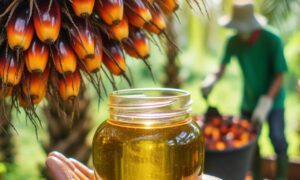Nagaland calls for broader consultations on palm oil cultivation

The Nagaland agricultural department supports consultations with stakeholders on palm oil cultivation, addressing environmental, social, and cultural concerns. Adviser Mhathung Yanthan emphasized transparency and sustainability, acknowledging issues raised by local groups. Palm oil cultivation, promoted under the NMEO-OP since 2015-16, targets 15,000 hectares of jhum fallow land.
Dimapur: The Nagaland agricultural department endorsed the need for broad-based consultations with stakeholders on palm oil cultivation in the state to ensure transparent public engagement and critical deliberations.Adviser to the department, Mhathung Yanthan, issued a press statement in this regard following concerns raised by the Nagaland Community Conserved Areas Forum (NCCAF) and other individuals and organisations on palm oil cultivation in the state recently.”These concerns can neither be ignored nor oversimplified,” he said.Appreciating their commitment to safeguarding Nagaland’s ecological and social integrity, he said their suggestions for fostering a transparent and informed dialogue on the long-term implications of palm oil cultivation were highly valued.
He said the process would address the long-term environmental impacts of not only palm oil cultivation, but also other plantation and field crops, including biodiversity conservation and water security.He said the state govt through the agriculture department had been promoting palm oil cultivation under the National Mission on Edible Oils–Oil Palm (NMEO-OP), recognising its potential for economic uplift of farmers, improving rural livelihoods, and boosting the state’s agricultural economy. However, he said such initiatives must be pursued with sensitivity to the unique socio-environmental landscape of the state.Yanthan also stressed that the raised concerns required a holistic, participatory, and evidence-based approach that considered the perspectives of farmers, environmental experts, civil society organisations and local communities.Further, he asserted that any developmental intervention must adhere to the principles of sustainability, inclusiveness and ecological balance.He recalled that the agriculture department introduced palm oil cultivation in the state in 2015-16 after a careful study of its economic, social and environmental impacts, with a target of covering approximately 15,000 hectares in the jhum fallow areas.He added that the department is in constant consultation with several globally renowned sustainable palm oil groups. While clarifications had been issued on various “myths and facts” surrounding palm oil cultivation, based on scientific findings from the ICAR-Indian Institute of Oil Palm Research, Yanthan, however, said concerns persist regarding its complex environmental, social, and cultural implications.
To read more about Edible Oil News continue reading Agriinsite.com
Source : The Times Of India














